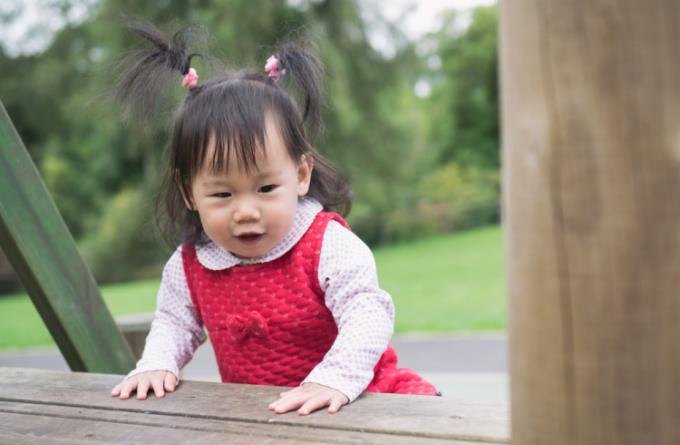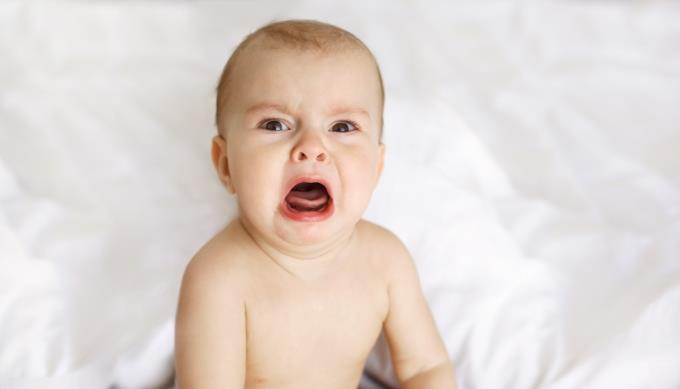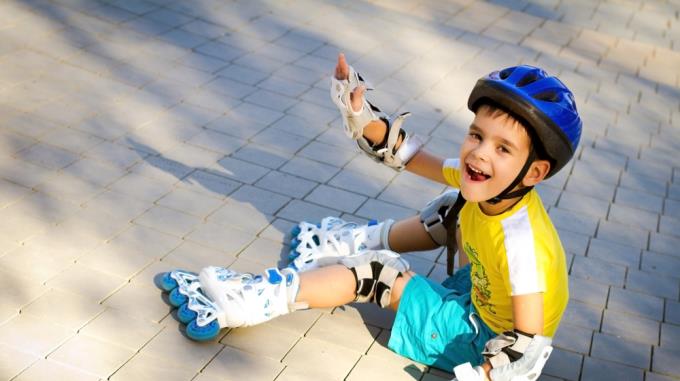Ways to determine an infants caloric needs

Learn how to determine your baby’s caloric needs, including the calories in breast milk and formula, to ensure your infant gets the right nutrition for healthy growth.
Childhood head injuries are more common in toddlers and preschool-aged children (3 - 5 years old). However, you can completely limit this risk for children.
Head trauma in young children is a medical condition that requires special attention and there are many causes. In the following article, aFamilyToday Health will point out the common causes of a child's head injury, how to handle the baby's injury and how to prevent it.

A child's head injury usually occurs after a baby falls or bumps or has a blow to the head. Causes can include:
Being hit by balls, sticks, hard-textured toys or being strongly collided with walls, doors, furniture, other household objects while running and jumping ...
Falling from above (windows, furniture, trees ...)
Traffic accidents
Falling off the bed, hammock
Parents toss the baby and slip his hand and drop the baby
Infants suffered head injuries due to excessive vibration and shaking
Was beaten ...
Most head injuries in children are falls. With infants, babies can fall when they fall out of bed / hammock. Toddlers and preschool-aged children often fall when climbing up high (furniture, bookshelves, beds, window frames ...) or fall when trying to go up / down stairs. Meanwhile, the cause of head injuries in older children is often falls while cycling, skateboards, electric balancing vehicles , sports ...
One of the scariest things about a head injury is that you cannot judge the extent of the injury a child has. A baby falling from a short distance usually only causes minor injuries, but can sometimes cause more serious symptoms than falling from a high table or window.
Therefore, accurate assessment of the child's injury and identifying abnormalities in the child is very important to protect the child's health. Your baby's trauma will be especially serious if:
Children appear to lose consciousness right after having a head injury
There is a change in behavior immediately following a head injury, such as becoming irritable, lethargic, showing dementia or loss of balance
Babies vomit after trauma, which is especially serious if the baby has been vomiting for a long time
Have a seizure right after the injury or a day later
Babies cannot close their eyes after being injured
Baby has other symptoms after head injury such as severe headache, stiff neck, light sensitivity
Baby has nose, ear ...
If you notice that your baby has one of the above symptoms after a fall, you need to take your baby to the hospital for the doctor to assess the situation and get medical attention immediately.
In addition, for children under 6 months old, falling and causing head injury, you should bring your baby to a doctor to ensure the safety of the child even if the child does not have the above symptoms.

Fortunately, most head injuries in children from falls are usually mild. Consequently, the child will not lose consciousness or have other serious symptoms.
Babies often cry after a fall that causes pain, but this quickly passes and the baby is playing again as usual. Therefore, you do not need to take your baby to the hospital for an X-ray or CT scan. Instead, monitor your baby at home and give first aid if:
If your baby bleeds, get proper first aid for the wound
Apply ice or apply cold, clean water to the swollen scalp for 10-15 minutes
Give your baby a break
If your baby is talking and complains of pain, you can give him pain relievers such as tylenol or ibuprofen in doses appropriate for their age and weight to relieve mild headache.
Observe the child for 12 - 24 hours to promptly recognize the more serious head injury symptoms for timely intervention. The symptoms may be severe: constant vomiting, severe headache, convulsions, loss of balance or behavior changes, blood flowing from the ears or nose ...
Some common myths about head injury in children with mild form include:
You are too afraid that your child might have some serious problems after a mild head injury, so you should not put your baby to bed for fear of being able to recognize any abnormalities. If this is the case, it is best to take your baby to the hospital for examination and diagnosis. Here, the doctors can make an accurate diagnosis of the baby's situation for your peace of mind.
The fact is that most children with mild head injuries don't have any serious symptoms, so it's okay to let your baby go to bed if it's time to sleep or nap time. However, you should keep an eye on your baby, especially within 24 hours of the injury to make sure he doesn't have any suspicious problems. If your baby sleeps, do not wake him up unless directed by your doctor.
For most babies, if it's time to go to bed and you don't put them in bed, they will become irritable. This will make it more difficult to recognize your child's abnormalities.
The truth is that most swelling in the head after a fall, or trauma, cannot confirm a baby's skull fracture or fracture. If you feel unsure about your baby's condition, you should take your baby to the hospital.
If there is a loss of consciousness after an injury, the baby is at high risk of having a serious head injury. However, in some cases, despite falling short distances, children are at risk of serious injury even though there is no loss of consciousness.
After your baby is injured, whether or not you take your baby to a medical examination or not, you should carefully monitor your baby. Seek medical attention if your baby shows any unusual signs.

Young children often find ways to climb on tables, chairs, stairs, motorbikes, bookshelves or run in a hurry, so they often bump into objects in the house ... This increases the risk of the baby being injured, especially injury. head. For children who are overactive or have health and mental problems such as cerebral palsy, epilepsy , parents should think about letting their children wear a helmet while playing and covering in rubber mats in the house.
In fact, it is very difficult to prevent situations that lead to a child's falls. Therefore, to limit your child's injury while playing, cycling, playing sports ..., you should do the following:
Let children wear helmets, elbow and knee protective gear when cycling, playing skateboard, roller skating ...
Minimize home hazards that can cause children to fall:
Attach a barrier to the stairs, so that the baby cannot climb the stairs without adult supervision
Attaching the door guards if the height of the floor and yard has a big difference: This will help limit the situation where the baby accidentally falls on the yard when crawling or running and playing ...
Use non-slip mats in bathrooms or other areas that are easily slippery
Use a rubber mat in your baby's private living area
If your baby is of toddler age and uses a walker, you should ensure your child's safety by: Even though your baby is in a walker, you must always keep an eye on your baby, not let him ride the walker. Go in a rough place, with a barrier separating the door, in case the baby pushes the car out, falls into the yard, the alley ...
When taking your child out on a motorbike, it is recommended that your baby wear a helmet (the type intended for young children). If your baby is young, you should not let your baby sit in a separate seat but use a carrier to carry the baby . For older children (3 - 5 years old), you should attach a separate front seat for your child to sit and use a belt to fix the baby on you. In addition, you should have a pillow mounted on the front of the car in case the emergency brake causes the baby to hit the head or chest on the front of the car.
If your family has a car, you should have a car seat appropriate for your child's age to ensure safety. If your baby has grown up, no need to use a chair, practice for him the habit of always wearing a seat belt when riding ...
aFamilyToday Health hopes that this article has provided you with useful information about head injury in young children, how to prevent accidents for children.
Learn how to determine your baby’s caloric needs, including the calories in breast milk and formula, to ensure your infant gets the right nutrition for healthy growth.
Discover the top 5 smartest dog breeds in the world, including Border Collie, Poodle, German Shepherd, Golden Retriever, and Doberman Pinscher. Learn about their unique traits and why they are considered the most intelligent dogs.
Discover 7 nutritious and delicious ways to cook egg porridge for babies, including recipes with cheese, pumpkin, tomato, and more. Learn how to prepare baby-friendly egg porridge with our expert tips.
After a series of medical measures they obtained a complete human vascular system profile.
Watermelon is one of the fruits that many people love, not only cheap but also delicious, nutritious and refreshing in the summer. To get delicious watermelon pieces, show off your housewives, your artistic talents to cut beautiful pieces of watermelon.
aFamilyToday Health - The digestive system and body in each baby is different. Parents need to recognize notes to deal with when babies have a food allergy!
Babies need many factors for perfect development. aFamilyToday Health shares with parents things to keep in mind when babies are 8 weeks old so that parents can take care of their babies the best!
Babies need many factors for perfect development. aFamilyToday Health shares with parents things to keep in mind when babies are 18 weeks so that parents can take care of their babies the best!
Babies need many factors for perfect development. aFamilyToday Health shares with parents things to keep in mind when babies are 28 weeks old so that parents can take care of their babies the best!
Babies need many factors for perfect development. aFamilyToday Health shares with parents things to keep in mind when babies are 32 weeks old so that parents can take care of their babies the best!








